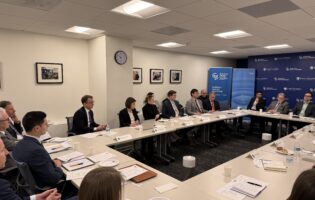Transatlantic Relations in a Changing World Order
On December 8, 2016, AGI hosted a seminar on “Transatlantic Relations in a Changing World Order: U.S. and European Responses to China’s Rise in Africa” with DAAD/AGI Research Fellow Dr. Anna Stahl. Her presentation focused on the EU’s and the United States’ reaction to China’s increased influence as an actor in Africa. China has gained more influence in Africa through a framework for diplomatic relations, bilateral contracts with African countries, and increasing trade with and aid to Africa. In addition, China and Africa introduced a security cooperation to stabilize African countries.
Europe considers itself as Africa’s traditional partner due to their colonial history. Since 2003, the EU has had a comprehensive strategic partnership with China and tries to engage and cooperate, rather than compete, with China. Most EU member states like Germany also have parallel partnerships with China. The EU introduced two policy initiatives with China to establish bilateral dialogues on Africa and to introduce trilateral dialogues with the EU, China, and the African Union. Since 2016, the EU cooperates with China on peace, security, and donor coordination in Africa. Germany is China’s biggest trading partner within in the EU and introduced a comprehensive strategic partnership with China in 2014. The two countries hold a dialogue on development between the German Ministry of Economic Cooperation and Development (BMZ) and the Chinese Ministry of Commerce (MOFCOM) and had their first China-Germany Consultation on Africa between the German Federal Foreign Office (AA) and the Chinese Ministry of Foreign Affairs in 2016.
President Obama changed the response to China’s influence in Africa from the role of a leader to that of a partner. As the first African-American president, Obama was expected to carry out more active policies toward Africa. The United States not only established a strategic and economic dialogue with China in 2009, but also refocused its diplomatic, economic, and military efforts to East Asia. The pivot to Asia had positive and negative impacts on U.S.-China relations. Looking at trade relations, China surpassed the United States as Africa’s single most important trading partner in 2009. While the European countries altogether are still a larger trading partner than China, the United States responded to China’s increased influence by seeking more talks about trade and investment in Africa.
There are two differences and two commonalities in EU and U.S. responses to China’s rise in Africa. Looking at the geographic proximity, Africa has more importance for Europe than for the United States, due to migration. Furthermore, Europe’s approach is to engage with and accommodate China’s rising influence in Africa, while the United States would like to see China act within an already given framework. In regard to commonalities, both actors made efforts to increase China’s international engagement and to focus on peacekeeping and increased security in Africa.
There are factors of uncertainty for the development of transatlantic relations. For example, uncertainty increased because of contrasting signals to China by President-Elect Trump and because of developments in Europe like Brexit and several upcoming elections. Looking on the prospects for transatlantic collaboration, Europe and the United States contemplate the implications of a more powerful China and have an interest in a stable and predictable international environment. However, the transatlantic dialogue on China has been limited so far. Ms. Stahl pointed out the need for closer coordination of transatlantic policy responses to China’s engagement in Africa that should focus on the common interests of investment and security in Africa.
In the final discussion, the effects of the maritime part of the “One Belt, One Road” initiative by China was brought into play as an important factor for future developments. It was also specified that China mainly invested in South Africa and countries that export natural resources. Chinese investments mainly focus on state-owned companies that are specialized in infrastructure. To a certain extent, Africa was the testing ground for Chinese investments in other countries. Altogether, the competition for attention by China, the United States, and the EU has led to economic gains for African countries.
Location
AICGS R. G. Livingston Conference Room
1755 Massachusetts Ave NW Suite 700 Washington, DC 20036 United States







